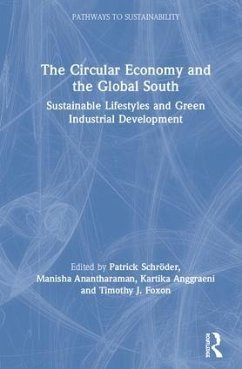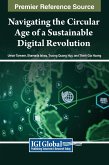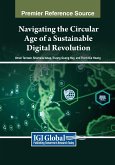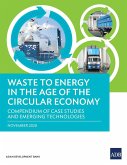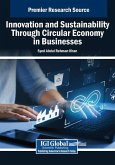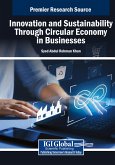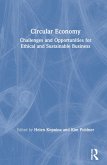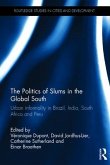The Circular Economy and the Global South
Sustainable Lifestyles and Green Industrial Development
Herausgeber: Schröder, Patrick; Anggraeni, Kartika; Anantharaman, Manisha
The Circular Economy and the Global South
Sustainable Lifestyles and Green Industrial Development
Herausgeber: Schröder, Patrick; Anggraeni, Kartika; Anantharaman, Manisha
- Gebundenes Buch
- Merkliste
- Auf die Merkliste
- Bewerten Bewerten
- Teilen
- Produkt teilen
- Produkterinnerung
- Produkterinnerung
This book examines the relevance of the circular economy in the context of developing countries, something which is little understood. It illustrates how the circular economy can be used as a new lens and possible solution to cross-cutting development issues of pollution and waste, employment, health, urbanisation and green industrialisation.
Andere Kunden interessierten sich auch für
![Navigating the Circular Age of a Sustainable Digital Revolution Navigating the Circular Age of a Sustainable Digital Revolution]() Navigating the Circular Age of a Sustainable Digital Revolution435,99 €
Navigating the Circular Age of a Sustainable Digital Revolution435,99 €![Navigating the Circular Age of a Sustainable Digital Revolution Navigating the Circular Age of a Sustainable Digital Revolution]() Navigating the Circular Age of a Sustainable Digital Revolution331,99 €
Navigating the Circular Age of a Sustainable Digital Revolution331,99 €![Waste to Energy in the Age of the Circular Economy Waste to Energy in the Age of the Circular Economy]() Asian Development BankWaste to Energy in the Age of the Circular Economy52,99 €
Asian Development BankWaste to Energy in the Age of the Circular Economy52,99 €![Innovation and Sustainability Through Circular Economy in Businesses Innovation and Sustainability Through Circular Economy in Businesses]() Innovation and Sustainability Through Circular Economy in Businesses157,99 €
Innovation and Sustainability Through Circular Economy in Businesses157,99 €![Innovation and Sustainability Through Circular Economy in Businesses Innovation and Sustainability Through Circular Economy in Businesses]() Innovation and Sustainability Through Circular Economy in Businesses206,99 €
Innovation and Sustainability Through Circular Economy in Businesses206,99 €![Circular Economy Circular Economy]() Circular Economy195,99 €
Circular Economy195,99 €![The Politics of Slums in the Global South The Politics of Slums in the Global South]() The Politics of Slums in the Global South206,99 €
The Politics of Slums in the Global South206,99 €-
-
-
This book examines the relevance of the circular economy in the context of developing countries, something which is little understood. It illustrates how the circular economy can be used as a new lens and possible solution to cross-cutting development issues of pollution and waste, employment, health, urbanisation and green industrialisation.
Hinweis: Dieser Artikel kann nur an eine deutsche Lieferadresse ausgeliefert werden.
Hinweis: Dieser Artikel kann nur an eine deutsche Lieferadresse ausgeliefert werden.
Produktdetails
- Produktdetails
- Verlag: Routledge
- Seitenzahl: 240
- Erscheinungstermin: 24. April 2019
- Englisch
- Abmessung: 240mm x 161mm x 18mm
- Gewicht: 529g
- ISBN-13: 9781138358928
- ISBN-10: 1138358924
- Artikelnr.: 56896394
- Herstellerkennzeichnung
- Libri GmbH
- Europaallee 1
- 36244 Bad Hersfeld
- gpsr@libri.de
- Verlag: Routledge
- Seitenzahl: 240
- Erscheinungstermin: 24. April 2019
- Englisch
- Abmessung: 240mm x 161mm x 18mm
- Gewicht: 529g
- ISBN-13: 9781138358928
- ISBN-10: 1138358924
- Artikelnr.: 56896394
- Herstellerkennzeichnung
- Libri GmbH
- Europaallee 1
- 36244 Bad Hersfeld
- gpsr@libri.de
Patrick Schröder is a Research Fellow at the Institute of Development Studies, UK and holds a PhD from Victoria University of Wellington, New Zealand. Manisha Anantharaman is an Assistant Professor in Justice, Community and Leadership at Saint Mary's College of California, USA and holds a PhD from University of California Berkeley, USA. Kartika Anggraeni is a project manager at the Collaborating Centre for Sustainable Consumption and Production (CSCP) in Wuppertal, Germany. She is currently co-managing an EU SWITCH Africa Green project in Kenya. Timothy J. Foxon is Professor of Sustainability Transitions at the University of Sussex, UK and the author of Energy and Economic Growth: Why we need a new pathway to prosperity (Routledge, 2017).
Part 1 Introduction 1. Sustainable lifestyles, livelihoods and the circular
economy Part 2 Narratives and politics of waste and the circular economy in
the Global South 2. The many circuits of a circular economy
3. The politics of marine plastics pollution 4. Circular economy and
inclusion of informal waste pickers: political economy perspectives from
India and Brazil 5. The role of women in upcycling initiatives in Jakarta,
Indonesia: A case for the circular economy in a developing country Part 3
Policy frameworks and green industrial development approaches 6. The
Argentinean Zero Waste Framework: implementation gaps and over-sight of
reusable menstrual management technologies 7. Assessment of the Circular
Economy Transition Readiness at a National Level: The Colombian Case 8.
Promoting Industrial Symbiosis in China's Industrial Parks as a Circular
Economy Strategy: The Experience of the TEDA Eco Centre 9. Accelerating the
Transition to a Circular Economy in Africa: case studies from Kenya and
South Africa Part 4 Livelihoods and traditional circular economy practices
10. Securing nutrition through the revival of circular lifestyles: A case
study of endogenous rural communities in Rajasthan 11. Contesting thoughts
and attitudes to 'Sufficiency': Organic farming in an urbanised village in
Thailand Part 5: Conclusion and Outlook: Circular economy approaches for
the Sustainable Development Goals 12. Which pathways lead towards an
inclusive circular economy?
economy Part 2 Narratives and politics of waste and the circular economy in
the Global South 2. The many circuits of a circular economy
3. The politics of marine plastics pollution 4. Circular economy and
inclusion of informal waste pickers: political economy perspectives from
India and Brazil 5. The role of women in upcycling initiatives in Jakarta,
Indonesia: A case for the circular economy in a developing country Part 3
Policy frameworks and green industrial development approaches 6. The
Argentinean Zero Waste Framework: implementation gaps and over-sight of
reusable menstrual management technologies 7. Assessment of the Circular
Economy Transition Readiness at a National Level: The Colombian Case 8.
Promoting Industrial Symbiosis in China's Industrial Parks as a Circular
Economy Strategy: The Experience of the TEDA Eco Centre 9. Accelerating the
Transition to a Circular Economy in Africa: case studies from Kenya and
South Africa Part 4 Livelihoods and traditional circular economy practices
10. Securing nutrition through the revival of circular lifestyles: A case
study of endogenous rural communities in Rajasthan 11. Contesting thoughts
and attitudes to 'Sufficiency': Organic farming in an urbanised village in
Thailand Part 5: Conclusion and Outlook: Circular economy approaches for
the Sustainable Development Goals 12. Which pathways lead towards an
inclusive circular economy?
Part 1 Introduction 1. Sustainable lifestyles, livelihoods and the circular
economy Part 2 Narratives and politics of waste and the circular economy in
the Global South 2. The many circuits of a circular economy
3. The politics of marine plastics pollution 4. Circular economy and
inclusion of informal waste pickers: political economy perspectives from
India and Brazil 5. The role of women in upcycling initiatives in Jakarta,
Indonesia: A case for the circular economy in a developing country Part 3
Policy frameworks and green industrial development approaches 6. The
Argentinean Zero Waste Framework: implementation gaps and over-sight of
reusable menstrual management technologies 7. Assessment of the Circular
Economy Transition Readiness at a National Level: The Colombian Case 8.
Promoting Industrial Symbiosis in China's Industrial Parks as a Circular
Economy Strategy: The Experience of the TEDA Eco Centre 9. Accelerating the
Transition to a Circular Economy in Africa: case studies from Kenya and
South Africa Part 4 Livelihoods and traditional circular economy practices
10. Securing nutrition through the revival of circular lifestyles: A case
study of endogenous rural communities in Rajasthan 11. Contesting thoughts
and attitudes to 'Sufficiency': Organic farming in an urbanised village in
Thailand Part 5: Conclusion and Outlook: Circular economy approaches for
the Sustainable Development Goals 12. Which pathways lead towards an
inclusive circular economy?
economy Part 2 Narratives and politics of waste and the circular economy in
the Global South 2. The many circuits of a circular economy
3. The politics of marine plastics pollution 4. Circular economy and
inclusion of informal waste pickers: political economy perspectives from
India and Brazil 5. The role of women in upcycling initiatives in Jakarta,
Indonesia: A case for the circular economy in a developing country Part 3
Policy frameworks and green industrial development approaches 6. The
Argentinean Zero Waste Framework: implementation gaps and over-sight of
reusable menstrual management technologies 7. Assessment of the Circular
Economy Transition Readiness at a National Level: The Colombian Case 8.
Promoting Industrial Symbiosis in China's Industrial Parks as a Circular
Economy Strategy: The Experience of the TEDA Eco Centre 9. Accelerating the
Transition to a Circular Economy in Africa: case studies from Kenya and
South Africa Part 4 Livelihoods and traditional circular economy practices
10. Securing nutrition through the revival of circular lifestyles: A case
study of endogenous rural communities in Rajasthan 11. Contesting thoughts
and attitudes to 'Sufficiency': Organic farming in an urbanised village in
Thailand Part 5: Conclusion and Outlook: Circular economy approaches for
the Sustainable Development Goals 12. Which pathways lead towards an
inclusive circular economy?

